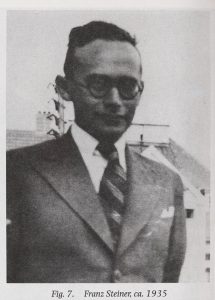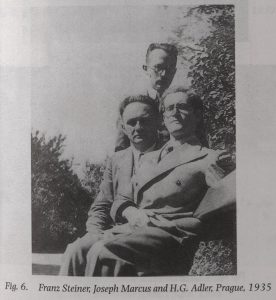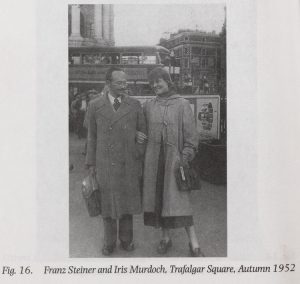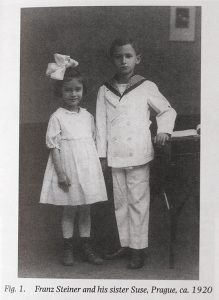This post is made on behalf of Brandon High, Special Collections Officer in the Foyle Special Collections Library, who has recently been cataloguing items for the HG Adler and Jeremy Adler collections described below.
By Brandon High
The collections of the novelist, poet and distinguished historian of the Holocaust HG Adler (1910-88) and his son, the eminent literary scholar, novelist and poet Professor Jeremy Adler, have for a long time added an extremely valuable dimension to the Foyle Special Collections Library. An exhibition on the Holocaust in 2006, held in the Weston Room at the Maughan Library, was based on materials from the HG Adler Collection
This piece concerns the career of the comparatively little known but fascinating poet and anthropologist Franz Baermann Steiner (1909-52), who was a friend of HG Adler from childhood. Steiner appointed HG Adler as his literary executor.
In common with his close personal friends, HG Adler and Elias Canetti, Steiner’s work was concerned with the causes and consequences of the Holocaust. Through the generosity of Professor Jeremy Adler, several items relating to him have recently been added to both the Jeremy Adler collection and the HG Adler collection.
Background
Steiner was born in Prague in 1909 to middle class German-speaking Jewish parents, who were able to fund his prolonged university studies. The ongoing emancipation of the Jews in Central Europe, coupled with the rise of a new pseudo-scientific antisemitism in the late 19th century, created new cultural tensions for Jewish intellectuals such as Steiner. These found expression in the fictions of Franz Kafka. Like Steiner, Kafka was an educated German-speaking Jew in Prague.
 Steiner’s position as a minority within a minority (as a Jew within a German-speaking minority within a majority Czech culture) gave him a particular vantage point as an anthropologist. He also embodied within himself the clash between tradition and modernity, as a practising Orthodox Jew whose intellectual outlook was imbued with Marxism.
Steiner’s position as a minority within a minority (as a Jew within a German-speaking minority within a majority Czech culture) gave him a particular vantage point as an anthropologist. He also embodied within himself the clash between tradition and modernity, as a practising Orthodox Jew whose intellectual outlook was imbued with Marxism.
Steiner’s intellectual formation
During the late 1920s and early 1930s, Steiner acquired an extremely broad and deep knowledge of philology, Semitic languages, the social sciences and Marxism, through his university studies and private reading. He had become a polymath before he had reached 30.
By the mid-1930s, when he had arrived in Britain for further study in London and Oxford, Steiner was already better educated than most British anthropologists. The breadth of his interests in German literature, the social sciences and Zionism is reflected in the books from his library now in our collections.
Steiner as anthropologist
 When Steiner was establishing his reputation, he suffered two huge personal blows. In 1942, his parents perished in Treblinka. Shortly afterwards, he began to suffer the persistent ill health which would result in his very premature death.
When Steiner was establishing his reputation, he suffered two huge personal blows. In 1942, his parents perished in Treblinka. Shortly afterwards, he began to suffer the persistent ill health which would result in his very premature death.
His only book length anthropological work was Taboo, (1956) of which there are several copies in the Jeremy Adler Collection. This is a critique of the theories of taboo as propounded by intellectuals since the mid-19th century, including those of the founder of anthropology, Sir James Frazer (1854-1941). Steiner exposes their ideas about the role of taboo in pre-modern societies as fatally undermined by their assumption that their own societies were the summit of human achievement.
Steiner made an important contribution to anthropology’s critique of its own history as a discipline. Although this work is not directly concerned with the Holocaust and antisemitism, it does examine the ways in which one culture can view other cultures with contempt. It concerns itself indirectly with the intellectual conditions which could cause genocide to occur.
Steiner and Canetti
While he was studying in Vienna, Franz Steiner formed a significant friendship with the writer Elias Canetti (1905-94), who was awarded the Nobel Prize for Literature in 1981. Canetti was also a friend of HG Adler.
Canetti’s novel, Auto-da-fé (1935), of which there are three copies in the HG Adler Collection with the author’s inscription, can be viewed as an anthropological study of a society where individuals have become so atomised and are so obsessed with pursuing their private concerns that society is in danger of devouring itself. This novel reflects Steiner’s own theories about the way in which modern societies have internalised demonic forces which were hitherto natural and external.
Steiner as poet
Steiner regarded his poetic vocation as more important than his work as a social scientist. Much of his poetry, particularly his long poem, ‘Prayer in the garden’, a copy of the first English translation of which is included in the Jeremy Adler Collection, is inspired directly by the Holocaust. The particular event which inspired this poem was the sinking of the Struma, a Jewish refugee ship, in the Black Sea in February 1942, after Great Britain and Turkey had both denied refuge to its passengers. This, and the fate of his parents in Treblinka in the same year, convinced Steiner that the whole of Europe was responsible for the Holocaust, and that the destiny of the Jewish people lay in Palestine.
Although Steiner’s work has been overshadowed by poets such as Paul Celan and Nelly Sachs, Celan regarded Steiner’s work highly. Steiner’s work shares with Celan a concern with the adequacy of language in general, and the German language in particular, to encompass the Holocaust.
Steiner and Iris Murdoch
 A very rare volume of Steiner’s poetry, In Babylons Nischen (In the Niches of Babylon), has been recently added to the HG Adler Collection, with HG Adler’s own provenance. This volume was due to be published in 1950, but was aborted at proof-stage. Two copies were produced, one for HG Adler, and one for the philosopher and novelist Iris Murdoch (1919-99).
A very rare volume of Steiner’s poetry, In Babylons Nischen (In the Niches of Babylon), has been recently added to the HG Adler Collection, with HG Adler’s own provenance. This volume was due to be published in 1950, but was aborted at proof-stage. Two copies were produced, one for HG Adler, and one for the philosopher and novelist Iris Murdoch (1919-99).
After Steiner’s death, HG Adler asked Murdoch to have his copy bound. It is this copy which is now in the HG Adler Collection, a moving testimony to relationships cut short all too prematurely.
Murdoch was a close friend of Steiner, with whom he had a deep intellectual affinity. He appears as a character in her novel The flight from the enchanter (1956), a copy of which with the author’s inscription is in the HG Adler Collection.
Acknowledgement
We would like to thank Professor Jeremy Adler for granting permission to use the images reproduced here. They are from:
Jeremy Adler, Richard Fardon. Selected writings / Franz Baerman Steiner. New York: Berghahn Books, 1999
Select bibliography
Jeremy Adler, Richard Fardon, Carol Lisa Tully (Editors). From Prague poet to Oxford anthropologist: Frank Baermann Steiner celebrated: essays and translations. München:, [London]: Iudicium, Institute of Germanic Studies, University of London, 2003
Michael Mack. Anthropology as memory: Elias Canetti’s and Franz Baermann Steiner’s responses to the Shoah. Tübingen: Niemeyer Verlag, 2001
